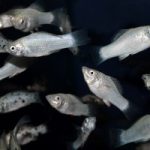
Feeding tropical fish is essential to their wellbeing. Too much or the wrong type of food could result in health issues or stunted growth.
Feed your fish small amounts that they can consume quickly to minimize waste in your aquarium.
Contents
Feeding Frequency
Fish have many dietary needs that depend on their species and diet. Omnivorous tropical fish should generally receive small portions of flakes or pellets once or twice daily.
Herbivorous (vegetarian) fish like silver dollars, mollies and farlowellas should be fed more frequently because their stomachs cannot contain as much food. As these species naturally feed on plants throughout their day in nature, these should receive several small feedings throughout the day or provided with live plants they can nibble at all day long.
Young fish still growing into full maturity require three or four feedings of special food designed for fry each day, depending on their metabolism. Coldwater varieties tend to have slower metabolic processes, thus decreasing frequency of feedings needed.
Feeding too frequently or providing your fish with too much food can cause digestive issues and water pollution. Excess digestive wastes and uneaten food will produce high levels of ammonia, nitrites and nitrates which can lead to decreased oxygen and pH levels, clogged filters and ultimately death for your fish.
Feeding Amount
How much to feed tropical fish depends on a number of variables including its species, size and other environmental conditions within an aquarium. There is no simple rule that governs this aspect.
Feed your fish no more food than they can consume within two or three minutes, as overfeeding could cause uneaten food to decay on the substrate and cloud the water, potentially creating dangerous ammonia spikes in your tank.
Most tropical fish species are herbivorous, meaning that they graze on algae naturally in the wild. Their bodies do not adjust well to being fed large quantities at one time; therefore it is better to feed smaller meals more regularly.
Herbivorous fish should also receive frozen or live foods to supplement their protein needs; two to three times each week is ideal. Bloodworm, daphnia and brine shrimp frozen foods should be provided for smaller species while mussels, cockles, shrimp and lancefish may be used with larger specimens.
Choosing the Right Food
Choose food tailored specifically to the dietary requirements of tropical fish to maintain their health and vitality. Achieve this through providing an assortment of nutritional vitamins.
Tropical fish require a diet which contains an ample supply of essential nutrients, including crude protein and fats as well as moderate levels of vitamins and minerals for healthy development of bones, organs and immunity systems.
Fish must receive adequate amounts of omega-3 fatty acids – the healthy fats which help prevent cardiovascular issues and inflammation – and essential amino acids like lysine and methionine to build muscle tissue and ward off disease.
An ideal tropical fish food should contain high protein levels and be carefully balanced between carbohydrates, fats and fiber content. Furthermore, it must be free from harmful additives like chemicals and dyes that could harm its residents.
Avoiding Overfeeding
Overfeeding tropical fish is a very common mistake among new aquarium owners, often having disastrous repercussions that range from negatively impacting water quality to damaging fish health.
First and foremost, make sure your fish is fed on a consistent schedule – especially newly hatched fry and young fish who have yet to fully develop. This step is especially crucial for newly hatched fry who still require proper development before reaching maturity.
Feeding too much can result in various issues, including cloudy water, increased ammonia levels, clogged filters and more. Luckily, these issues can often be rectified once feeding habits have been adjusted accordingly.
Overfeeding may result in algae blooms, taking up valuable tank space and draining nutrients out of the water, harming plants and aquarium decor as well as sucking oxygen away from fish tanks – an environment which may not be good for their wellbeing.


